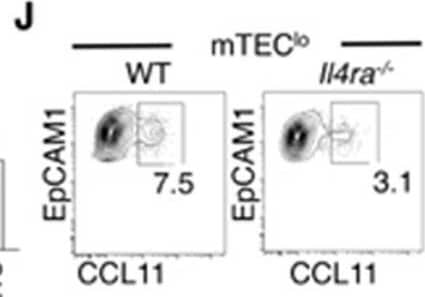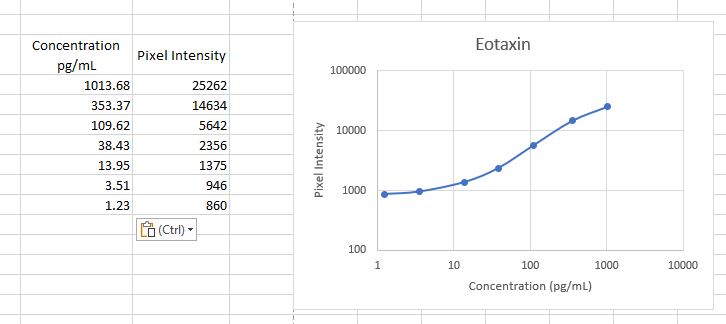Mouse CCL11/Eotaxin Antibody Summary
His24-Pro97
Accession # P48298
Applications
Mouse CCL11/Eotaxin Sandwich Immunoassay
Please Note: Optimal dilutions should be determined by each laboratory for each application. General Protocols are available in the Technical Information section on our website.
Scientific Data
 View Larger
View Larger
Chemotaxis Induced by CCL11/Eotaxin and Neutral-ization by Mouse CCL11/ Eotaxin Antibody. Recombinant Mouse CCL11/ Eotaxin (Catalog # 420-ME) chemoattracts the BaF3 mouse pro-B cell line transfected with mouse CCR3 in a dose-dependent manner (orange line). The amount of cells that migrated through to the lower chemotaxis chamber was measured by Resazurin (Catalog # AR002). Chemotaxis elicited by Recombinant Mouse CCL11/ Eotaxin (10 ng/mL) is neutralized (green line) by increasing concentrations of Goat Anti-Mouse CCL11/Eotaxin Antigen Affinity-purified Polyclonal Antibody (Catalog # AF-420-NA). The ND50 is typically 0.1-0.5 µg/mL.
 View Larger
View Larger
CCL11/Eotaxin in Mouse Colon. CCL11/Eotaxin was detected in perfusion fixed frozen sections of mouse colon using Goat Anti-Mouse CCL11/Eotaxin Antigen Affinity-purified Polyclonal Antibody (Catalog # AF-420-NA) at 15 µg/mL overnight at 4 °C. Tissue was stained using the Anti-Goat HRP-DAB Cell & Tissue Staining Kit (brown; Catalog # CTS008) and counterstained with hematoxylin (blue). Specific staining was localized to cytoplasm. View our protocol for Chromogenic IHC Staining of Frozen Tissue Sections.
 View Larger
View Larger
Detection of CCL11/Eotaxin by Flow Cytometry IL4R alpha Signalling Stimulates CCL11 Production by mTEC.Analysis of TEC subsets in WT and Il4ra-/- mice at d7 post SLI (A), n=9, and (B) analysis of TEC (n=6-8) and T-cell development at d35 (n=11). (C) Representative FACS plots of thymic eosinophils in steady state WT and Il4ra-/- mice. Quantitation of thymus cellularity and thymic eosinophils at d0 (D) and d1 (E) in WT and Il4ra-/- mice, n=9 at d0, n=7-8 at d1. (F) Representative FACs plots of CCL11 expression in thymic stromal populations, showing proportions (G) and quantitation at d0 and d1 (H), with MFI of CCL11 for mTEClo, n=8. (I) qPCR analysis of Ccl11 mRNA expression E15 2-deoxyguanosine thymic organ cultures, treated for 4 days +/- IL4/IL13, with analysis conducted using a one-way ANOVA with Bonferroni post-test. (J) Representative FACS plots for expression of CCL11 by mTEClo in WT (left panel) and Il4ra-/- (right panel) with quantitation shown in (K), n=8. All data from at least 2-3 independent experiments. All bars show mean ± SEM, * p<0.05, ** p<0.01, *** p<0.001, **** p<0.0001 from an unpaired students t-test unless otherwise specified. Image collected and cropped by CiteAb from the following open publication (https://pubmed.ncbi.nlm.nih.gov/35275754), licensed under a CC-BY license. Not internally tested by R&D Systems.
Reconstitution Calculator
Preparation and Storage
- 12 months from date of receipt, -20 to -70 °C as supplied.
- 1 month, 2 to 8 °C under sterile conditions after reconstitution.
- 6 months, -20 to -70 °C under sterile conditions after reconstitution.
Background: CCL11/Eotaxin
CCL11 is a potent eosinophil chemoattractant that was originally purified from bronchoalveolar lavage fluid of guinea pigs sensitized by aerosol challenge with ovalbumin. Microsequencing of the purified protein revealed the guinea pig CCL11 to be a member of the beta (CC) chemokine family of inflammatory and immunoregulatory cytokines. cDNA clones for guinea pig, mouse and human CCL11 have been isolated. Mouse CCL11 cDNA encodes a 97 amino acid residue precursor protein from which the amino-terminal 23 amino acid residues are cleaved to generate the 74 amino acid residue mature mouse CCL11. At the protein sequence level, mature mouse CCL11 is approximately 60% identical to mature human and guinea pig CCL11. In addition, mouse CCL11 also shows high amino acid sequence identity to members of the MCP family. Mouse CCL11 is chemotactic for eosinophils, but not mononuclear cells or neutrophils. CCL11 mRNA is expressed in a variety of tissues. The expression of CCL11 mRNA is induced in cultured endothelial cells in response to IFN-gamma. In addition, CCL11 mRNA is also induced in response to the transplantation of IL-4-secreting tumor cells. The CC chemokine receptor 3 (CCR3) has now been identified to be a specific human CCL11 receptor.
- Rothenberg, M.E. et al. (1995) Proc. Natl. Acad. Sci. USA 92:8960.
- Kitaura, M. et al. (1996) J. Biol. Chem 271:7725.
- Garcia-Zepeda, E.A. et al. (1996) Nature Medicine 2:449.
- Ponath, P.D. et al. (1996) J. Clin. Invest. 97:604.
Product Datasheets
Citations for Mouse CCL11/Eotaxin Antibody
R&D Systems personnel manually curate a database that contains references using R&D Systems products. The data collected includes not only links to publications in PubMed, but also provides information about sample types, species, and experimental conditions.
23
Citations: Showing 1 - 10
Filter your results:
Filter by:
-
Alendronate Attenuates Eosinophilic Airway Inflammation Associated with Suppression of Th2 Cytokines, Th17 Cytokines, and Eotaxin-2
Authors: Oh Sasaki, Mitsuru Imamura, Yusuke Yamazumi, Hiroaki Harada, Taku Matsumoto, Katsuhide Okunishi et al.
The Journal of Immunology
-
Eosinophils are an essential element of a type 2 immune axis that controls thymus regeneration
Authors: Emilie J. Cosway, Andrea J. White, Sonia M. Parnell, Edina Schweighoffer, Helen E. Jolin, Andrea Bacon et al.
Science Immunology
-
Innate Lymphoid Cells Play a Pathogenic Role in Pericarditis
Authors: HS Choi, T Won, X Hou, G Chen, W Bracamonte, MV Talor, I Jur?ová, O Szárszoi, L ?urnova, I St?íž, JE Hooper, V Melenovský, D ?iháková
Cell Rep, 2020-03-03;30(9):2989-3003.e6.
Species: Mouse
Sample Types: Whole Tissue
Applications: IHC -
A role for endothelial cells in radiation-induced inflammation
Authors: M Boström, M Kalm, Y Eriksson, C Bull, A Ståhlberg, T Björk-Erik, N Hellström, K Blomgren
Int. J. Radiat. Biol., 2018-02-07;0(0):1-36.
Species: Mouse
Sample Types: Whole Tissue
Applications: IHC -
Modulation of the diet and gastrointestinal microbiota normalizes systemic inflammation and ?-cell chemokine expression associated with autoimmune diabetes susceptibility
Authors: AM Henschel, SM Cabrera, ML Kaldunski, S Jia, R Geoffrey, MF Roethle, V Lam, YG Chen, X Wang, NH Salzman, MJ Hessner
PLoS ONE, 2018-01-02;13(1):e0190351.
Species: Rat
Sample Types: Whole Tissue
Applications: IHC -
CCL11, a novel mediator of inflammatory bone resorption
Authors: E Kindstedt, CK Holm, R Sulniute, I Martinez-C, R Lundmark, P Lundberg
Sci Rep, 2017-07-13;7(1):5334.
Species: Mouse
Sample Types: Whole Tissue
Applications: IHC -
Macrophages and cardiac fibroblasts are the main producers of eotaxins and regulate eosinophil trafficking to the heart
Eur J Immunol, 2016-10-25;0(0):.
Species: Mouse
Sample Types: Whole Tissue
Applications: IHC-P -
Iddm30 controls pancreatic expression of Ccl11 (Eotaxin) and the Th1/Th2 balance within the insulitic lesions.
Authors: Chao G, Wallis R, Marandi L, Ning T, Sarmiento J, Paterson A, Poussier P
J Immunol, 2014-03-19;192(8):3645-53.
Species: Rat
Sample Types: Cell Lysates, Whole Tissue
Applications: IHC-Fr, Western Blot -
Suppression of laser-induced choroidal neovascularization by a CCR3 antagonist.
Authors: Mizutani, Takeshi, Ashikari, Masayuki, Tokoro, Mayumi, Nozaki, Miho, Ogura, Yuichiro
Invest Ophthalmol Vis Sci, 2013-02-28;54(2):1564-72.
Species: Mouse
Sample Types: Whole Tissue
Applications: IHC -
Response patterns of cytokines/chemokines in two murine strains after irradiation.
Authors: Zhang M, Yin L, Zhang K, Sun W, Yang S, Zhang B, Salzman P, Wang W, Liu C, Vidyasagar S, Zhang L, Ju S, Okunieff P, Zhang L
Cytokine, 2012-01-25;58(2):169-77.
Species: Mouse
Sample Types: Plasma
Applications: Luminex Development -
The ageing systemic milieu negatively regulates neurogenesis and cognitive function.
Authors: Villeda SA, Luo J, Mosher KI, Zou B, Britschgi M, Bieri G, Stan TM, Fainberg N, Ding Z, Eggel A, Lucin KM, Czirr E, Park JS, Couillard-Despres S, Aigner L, Li G, Peskind ER, Kaye JA, Quinn JF, Galasko DR, Xie XS, Rando TA, Wyss-Coray T
Nature, 2011-08-31;477(7362):90-4.
Species: Mouse
Sample Types: Whole Cells
Applications: Neutralization -
Comprehensive assessment of chemokine expression profiles by flow cytometry.
Authors: Eberlein J, Nguyen TT, Victorino F, Golden-Mason L, Rosen HR, Homann D
J. Clin. Invest., 2010-02-08;120(3):907-23.
Species: Mouse
Sample Types: Whole Cells
Applications: Flow Cytometry -
House dust mite induces direct airway inflammation in vivo: implications for future disease therapy?
Authors: De Alba J, Raemdonck K, Dekkak A, Collins M, Wong S, Nials AT, Knowles RG, Belvisi MG, Birrell MA
Eur. Respir. J., 2009-10-19;35(6):1377-87.
Species: Rat
Sample Types: Whole Tissue
Applications: IHC-P -
CCR3 is a target for age-related macular degeneration diagnosis and therapy.
Authors: Takeda A, Baffi JZ, Kleinman ME, Cho WG, Nozaki M, Yamada K, Kaneko H, Albuquerque RJ, Dridi S, Saito K, Raisler BJ, Budd SJ, Geisen P, Munitz A, Ambati BK, Green MG, Ishibashi T, Wright JD, Humbles AA, Gerard CJ, Ogura Y, Pan Y, Smith JR, Grisanti S, Hartnett ME, Rothenberg ME, Ambati J
Nature, 2009-06-14;460(7252):225-30.
Species: Mouse
Sample Types: Vitreous Humor
Applications: Neutralization -
Resolution of allergic inflammation and airway hyperreactivity is dependent upon disruption of the T1/ST2-IL-33 pathway.
Authors: Kearley J, Buckland KF, Mathie SA, Lloyd CM
Am. J. Respir. Crit. Care Med., 2009-01-29;179(9):772-81.
Species: Mouse
Sample Types: Cell Culture Supernates
Applications: ELISA Development -
IL-13Ralpha2 and IL-10 coordinately suppress airway inflammation, airway-hyperreactivity, and fibrosis in mice.
Authors: Wilson MS, Elnekave E, Mentink-Kane MM, Hodges MG, Pesce JT, Ramalingam TR, Thompson RW, Kamanaka M, Flavell RA, Keane-Myers A, Cheever AW, Wynn TA
J. Clin. Invest., 2007-10-01;117(10):2941-51.
Species: Mouse
Sample Types: Serum
-
Toll-like receptor-2-mediated C-C chemokine receptor 3 and eotaxin-driven eosinophil influx induced by Mycobacterium bovis BCG pleurisy.
Authors: D&apos;Avila H, Almeida PE, Roque NR, Castro-Faria-Neto HC, Bozza PT
Infect. Immun., 2006-12-11;75(3):1507-11.
Species: Mouse
Sample Types: In Vivo
Applications: Neutralization -
Circulating cytokine/inhibitor profiles reshape the understanding of the SIRS/CARS continuum in sepsis and predict mortality.
Authors: Osuchowski MF, Welch K, Siddiqui J, Remick DG
J. Immunol., 2006-08-01;177(3):1967-74.
Species: Mouse
Sample Types: Plasma
Applications: ELISA Development -
Sequential ELISA to profile multiple cytokines from small volumes.
Authors: Osuchowski MF, Siddiqui J, Copeland S, Remick DG
J. Immunol. Methods, 2005-07-01;302(1):172-81.
Species: Mouse
Sample Types: Plasma
Applications: ELISA Development -
A soluble chemokine-binding protein from vaccinia virus reduces virus virulence and the inflammatory response to infection.
Authors: Reading PC, Symons JA, Smith GL
J. Immunol., 2003-02-01;170(3):1435-42.
Species: Human
Sample Types: BALF
Applications: ELISA Development -
P-selectin mediates IL-13-induced eosinophil transmigration but not eotaxin generation in vivo: a comparative study with IL-4-elicited responses.
Authors: Larbi KY, Dangerfield JP, Culley FJ, Marshall D, Haskard DO, Jose PJ, Williams TJ, Nourshargh S
J. Leukoc. Biol., 2003-01-01;73(1):65-73.
Species: Mouse
Sample Types: Peritoneal Fluid
Applications: ELISA Development -
AMD3100, a CxCR4 antagonist, attenuates allergic lung inflammation and airway hyperreactivity.
Authors: Lukacs NW, Berlin A, Schols D, Skerlj RT, Bridger GJ
Am. J. Pathol., 2002-04-01;160(4):1353-60.
Species: Human
Sample Types: Tissue Homogenates
Applications: ELISA Development -
Ablation of Tumor Progression Locus 2 Promotes a Type 2 Th Cell Response in Ovalbumin-Immunized Mice
Authors: Wendy T. Watford, Chun-Chi Wang, Christos Tsatsanis, Lisa A. Mielke, Aristides G. Eliopoulos, Constantine Daskalakis et al.
The Journal of Immunology
FAQs
No product specific FAQs exist for this product, however you may
View all Antibody FAQsReviews for Mouse CCL11/Eotaxin Antibody
Average Rating: 4.7 (Based on 3 Reviews)
Have you used Mouse CCL11/Eotaxin Antibody?
Submit a review and receive an Amazon gift card.
$25/€18/£15/$25CAN/¥75 Yuan/¥2500 Yen for a review with an image
$10/€7/£6/$10 CAD/¥70 Yuan/¥1110 Yen for a review without an image
Filter by:
Worked as capture antibody
Rat pancreatic islet lysate were blotted overnight in 4 degree with polyclonal goat anti-mouse Ccl11. Serial dilution of lysate in the firs 2 lanes followed by 2 lanes of recombinant rat Ccl11.
Specificity: Reasonably specific
Sensitivity: Reasonably sensitive
Buffer: PBS
Dilution: 1/1000





